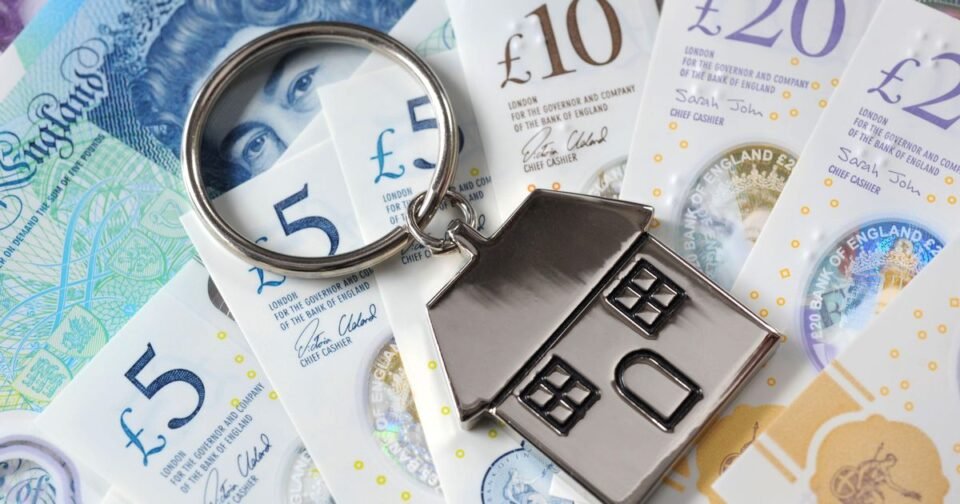Typical first-time buyers face paying £227,757 to get their first step on the property ladder, a jump of nearly a fifth since the Conservatives were elected in 2019, according to property website Rightmove.
Someone newly getting onto the property ladder can expect to pay around £400 more per month for their mortgage than five years ago. Calculations by property website Rightmove suggest the average first-time buyer mortgage payment has risen by 61 per cent since the last General Election in 2019, from £667 to £1,075 per month.
The calculations made various assumptions, including that first-time buyers would have a 20 per cent deposit to put down, that their mortgage term would last 25 years and that they were taking out a five-year fixed-rate mortgage on an average rate.
Rightmove also used average asking prices of a typical first-time buyer homes, with two bedrooms or fewer, for the research. Across Britain, first-time buyers now face paying £227,757 for a home, an amount which has jumped by nearly a fifth (19%) since 2019.
READ MORE: Thousands of households to get £200 cost of living payment by end of July
In the north-west of England, asking prices for first-time buyer homes have jumped by a third (33%) since 2019, while London has seen the smallest percentage rise of just 6 per cent over the past five years, according to the website. London house prices are typically higher than elsewhere in Britain – and the average price tag on a first-time buyer property there according to Rightmove’s data is over half a million pounds.
Rises in mortgage rates as well as house prices have also had an impact on monthly mortgage costs. The Bank of England base rate remained on hold last week, but with Consumer Prices Index (CPI) inflation having slowed to its 2 per cent target, a base rate cut is still expected on the horizon.
Tim Bannister, Rightmove’s property expert, said: “As rates have increased over the last five years, the amount that a typical first-time buyer is paying each month on a mortgage has outstripped the pace of earning growth. Some first-time buyers are looking at extending their mortgage terms to 30 or 35 years to lower monthly payments, or looking at cheaper homes for sale so that they need to borrow less.
“If mortgage rates reduce, this will help first-time buyers in the short-term more so than election housing promises. We hope that the next government can support first-time buyers with well thought out policies, which address the difficulties of saving up a large enough deposit and being able to borrow enough from a lender.”
What do voters want from the next government?
The findings were released as another property website, Zoopla, found that building more affordable homes, tackling homelessness and rough sleeping and reducing the number of empty homes were ranked by people as the top housing priorities for the next government.
Ipsos research carried out for Zoopla also found that helping first-time buyers onto the property ladder and controlling rent rises in the private sector rounded out the top five.
Richard Donnell, executive director at Zoopla, said: “British voters have high expectations from a new government on housing. The overarching response is: ‘Build more homes, but other things matter too’.
“People’s experiences and priorities vary based on their position in the market. Renters want more focus on their priorities including raising housing benefit levels and managing the pace of rental growth, while also improving rights and protections.
“Rent reforms are on the agenda for all parties but managing rental inflation is best achieved by growing supply through new home building as measures to control rents can reduce new investment. It is clear voters are well aware of the pressures on the housing market with reducing homelessness and rough sleeping and doing more to reduce empty and under-utilised homes in the top three priorities.”
Ben Marshall, research director at Ipsos said: “The survey also finds a sense that the governments can affect change.”
Nathan Emerson, chief executive at Propertymark, said: “Surging interest rates and inflation over the last few years have impacted the housing market with force.
“However, with the next General Election now under two weeks away, Propertymark is keen to see targeted support for first-time buyers at the first opportunity from any incoming government.
“The potential of home ownership should never be a prospect that is ever out of reach for people. As inflation is now back within the range initially targeted, we are optimistic to see the base rate cut as soon as realistically possible, which would be very welcome news for people stepping onto the housing ladder when it does happen.”
Here is the average first-time buyer property asking price in 2024, according to Rightmove and the percentage increase compared with 2019:
- East Midlands, £192,497, 24 per cent
- East of England, £272,539, 14 per cent
- London, £507,049, 6 per cent
- North East, £131,809, 22 per cent
- North West, £177,588, 33 per cent
- Scotland, £139,198, 22 per cent
- South East, £296,238, 15 per cent
- South West, £256,687, 24 per cent
- Wales, £180,458, 28 per cent
- West Midlands, £193,957, 24 per cent
- Yorkshire and the Humber, £178,871, 30 per cent

